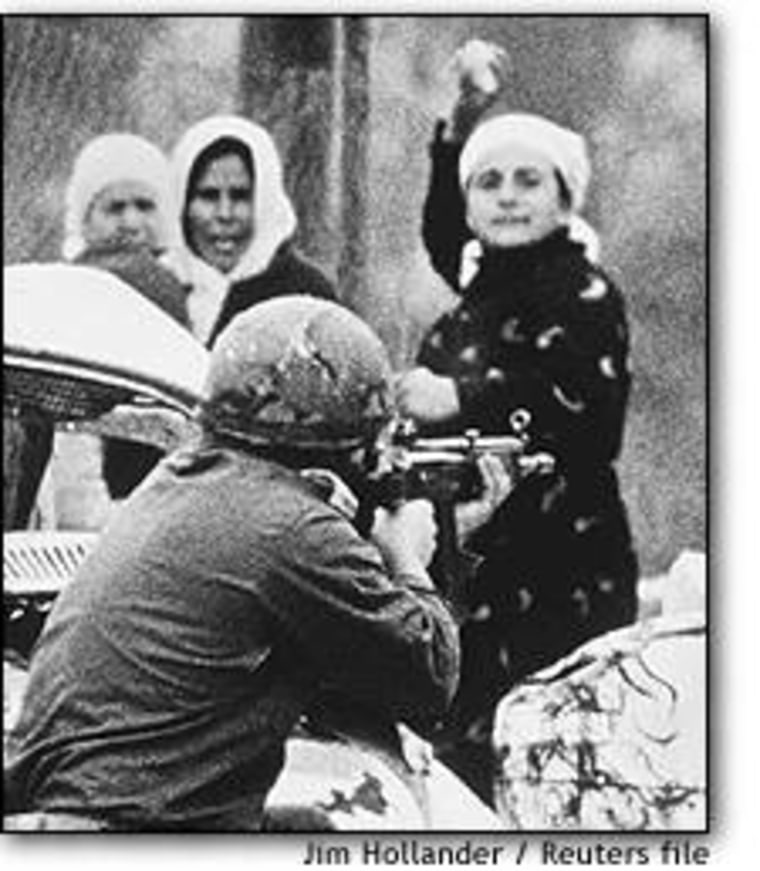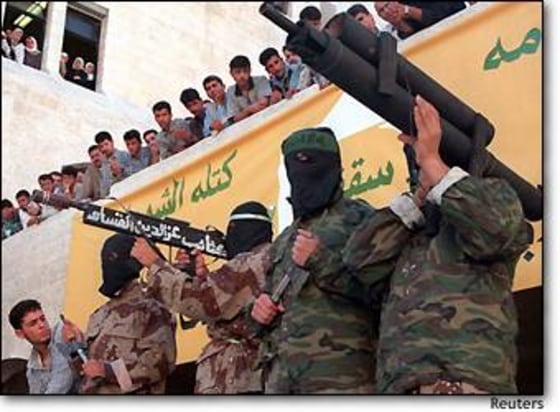Yasser Arafat’s jails now brim with 300 leading members of Hamas, the radical Palestinian group whose military wing continues to pursue a violent war against Israel. Hamas has responded to the arrests by branding Arafat a traitor and hinting that some in Hamas may be tempted to turn their guns on the Palestinian Authority. Many Israelis will shrug this off or even welcome the idea of their old enemies killing each other. They should think again.
>ON THE SURFACE, Arafat’s decision to crack down seriously on Hamas would seem uncontroversial. The Hamas military wing, after all, is the single most serious threat to the Oslo peace accords. To describe its attacks on civilians as “indiscriminate” would be incorrect: last week’s foiled attack on a school bus in Gaza was a discriminated effort to target children. Why not wipe this group out? What possible objection could there be?
INSIDE THE WALL
To Israelis who oppose the peace process, Arafat’s tolerance of Hamas is evidence that he can’t be trusted. These Israelis, including many of the more right-wing members of Benjamin Netanyahu’s cabinet, hate the Oslo process because it allowed the PLO “inside the walls” of Israel’s security cordon. Terrorism, once a problem that occasionally infiltrated Israel from abroad, now is planned and launched from within Israel’s borders.
This theory ignores the fact that deaths from terrorist incidents inside Israel have fallen to record lows for the past two years. More seriously, it ignores the terrible price both Israelis and Palestinians will pay if Arafat loses in his confrontation with Hamas. What’s worse: an outlawed terrorist organization inside your borders, or a full-blown Palestinian civil war?
COURTING DISASTER
Israeli sources tell me that the Mossad has repeatedly warned the Netanyahu government that forcing Arafat’s hand in this matter could lead to disaster. As much as Israelis may hate Arafat, he has become indispensable to their future.

Yet in the past week, primarily due to Israeli demands, Arafat’s future — and perhaps that of the peace process — have been mortgaged. Already tarred in the eyes of Palestinians for agreeing to have his police force monitored by the U.S. Central Intelligence Agency, Arafat has been forced to move against a group which has as much support, if not more, than he does.
Throughout the five-year peace process, declaring war on Hamas is something the Palestinian leader has tried to avoid. The reasons became evident on Sunday, when the Hamas military wing, the Izzidin Qassim Brigades, released a statement saying that Arafat “and his oppressive security apparatus have committed the utmost in betrayal, complete subordination and absolute loyalty to Israel.”
The statement hinted that Hamas units may turn their guns against Arafat’s police in response. A new intifada, this time directed against Arafat, may be brewing.
REALPOLITIK

Most analysts view Arafat’s previous resistance to this kind of crackdown (far from being proof of his duplicity, as the right-wing Israeli legislator Benny Begin once put it) is about self-preservation and ultimately securing the peace process. There are two reasons for this.
Internal politics: Even though Hamas opposes the peace process, Arafat felt he could not afford to alienate the movement for fear of angering hawks within his own Fatah movement and awakening Islamic fundamentalist demands.
Netanyahu regularly plays to his right-wing constituency, only to reverse course once he sits down at the negotiating table. But what is accepted as political theater in Israel is not extended to Arafat. The Palestinian leader’s appearances with Sheikh Yassin, the Hamas founder and a hero of the intifada, were played up in the Israeli press as pandering to Hamas.
Hamas popularity: As incongruous as it may appear to outsiders, Hamas is far more than a terrorist group, or even political organization. Like many serious guerrilla movements — Ireland’s Sinn Fein or Spain’s Basque separatist Herri Batusana (ETA) — Hamas is active in running medical clinics, distributing food and providing education in the miserable confines of Gaza’s refugee camps. It also has a tightly organized political wing that provides an alternative to Arafat’s corruption-plagued PLO officials, many of whom are bitterly resented for returning from cozy lives in exile in 1994 to build themselves palaces amid the squalor of the refugee camps. Amid the shattered Palestinian expectations of the peace process, Hamas is one of the few alternatives.
WORTH THE RISK?
The Israeli tactic here is less than subtle and it’s the same one that has predominated throughout the Netanyahu government. Set the security bar high enough and the Palestinians are bound to fail. When they do, press the advantage.
Attacks by Hamas, despite being outside the control of Arafat’s Palestinian Authority, have regularly been equated with attacks ordered (or at least condoned) by Arafat himself. Typically, Israel then demands a crackdown and more often than not the incident is seized upon as an excuse not to implement the next phase of the Oslo agreement — or in this case, the Wye accords.
At the same time, Israelis will quickly cite the very real human rights abuses by Arafat’s police when explaining why they will never accept the idea of an independent Palestinian state.
Certainly Israel has every right to demand justice for the crimes commited by Hamas. Despite the group’s extra-curricular activities, Hamas remains at heart an instrument of terror, one with a particularly cynical view of how to upset the political balance.
Yet Israel may come to regret the harshness of its most recent demands on Arafat. An Israeli leader killed for taking unpopular actions will be succeeded, at least in the short run, by another figure determined to carry on. A system is in place; the transition works. A murdered Palestinian leader, on the other hand, would leave only chaos in his wake, and Hamas would emerge not only as a threat to the peace process but as a threat to assume the mantle of leadership. All reasons why a policy that pushes the Palestinians toward civil war may be one that trades bad for worse.
Michael Moran is MSNBC’s International Editor
